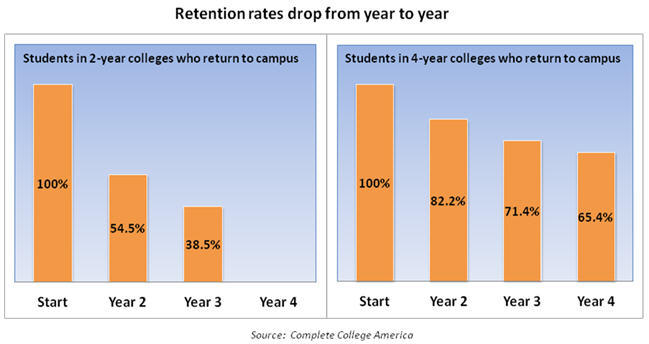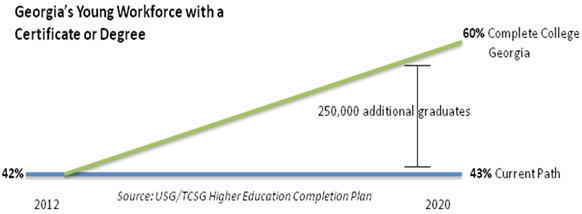
Complete College Georgia: An Overview
December 9, 2011
In August 2011, Governor Nathan Deal announced the Complete College Georgia Initiative, which provides concrete steps to address college access and completion. The Complete College Georgia Initiative, based in part on a $1 million grant received from the Complete College America Foundation, is a set of policy priorities and supporting action plans that serve as a direct response to the higher education issues and future employment needs that impact our state.
Why does Georgia need the Complete College Georgia Initiative?

Georgia faces a substantial skills gap between its future job needs and its available, qualified workforce. By the year 2020, more than 60 percent of the jobs in Georgia will require a career certificate or college degree. Currently, only 42 percent of Georgia's young adults have a college education (a career certificate, an associate's degree, or a bachelor's degree or higher), and the retention rates at Georgia colleges and universities are declining. For students who start in 2-year colleges and attend full-time, approximately 55 percent return for Year 2 and that number drops further to around 39 percent by Year 3. Of students entering a 4-year college and attending full-time, only 82 percent return for Year 2, and by Year 4, the number of students returning drops to 65 percent. The data is even more discouraging for part-time students.
Furthermore, those students who stay in college are not graduating on schedule. In Georgia, 57 percent of students starting a bachelor's degree program graduate within six years; only 11 percent starting an associate's degree program in the University System of Georgia (USG) graduate within three years; and in the Technical College System of Georgia (TCSG), 20 percent of students starting an associate's degree graduate within three years, and 23 percent of students starting a certificate graduate within two years.
If Georgia does not act on this issue, the state's higher education attainment is expected to only increase to about 43 percent by 2020. In order to reach the goal of 60 percent of adults with a college degree or certificate by 2020, Georgia colleges and universities need to have approximately 250,000 additional graduates over the next eight years, or an annual increase of 4.6 percent in degrees received. To meet college completion goals and future workforce demands, Georgia must take deliberate steps to increase access to higher education and ensure that students graduate with postsecondary degrees within a reasonable timeframe. The viability of Georgia's economy is at stake. The USG and TCSG highlighted the seriousness of the situation by stating that, "without a workforce that can fulfill the needs of the economy, the state may risk not only the loss of new employers and new business creation, but also existing jobs to more educated states and countries.

What are the Governor's strategies for Complete College Georgia?
The Complete College Georgia Initiative strengthens collaborative efforts of the different agencies and stakeholders focused on certificate and degree completion. As part of the Complete College America grant, Georgia has a Complete College America Council (CCA Council) that involves the governor's office, the agency heads and board chairs of the University System of Georgia (USG), the Technical College System of Georgia (TCSG), and the Georgia Department of Education (GaDOE), the Georgia Student Finance Commission, and key business, community, and philanthropic leaders. This CCA Council brings all of these agencies and community leaders together toward the common goal of increasing college completion in Georgia. In addition, Georgia already had an existing P-20 policy structure, known as the Alliance of Education Agency Heads (AEAH), which includes the leaders of Georgia's key education agencies that work on behalf of all of Georgia's students from infantry to postsecondary degree attainment. Through the Complete College Georgia Initiative, all of Georgia's education agencies and community partners will be working together to increase Georgia's educated workforce.
The governor's plan for combating the issue of college completion is prescribed by the following strategies:
1. Development of comprehensive system-wide and campus-level completion plans
The USG and TCSG recently released their comprehensive system-wide completion plan, Complete College Georgia: Georgia's Higher Education Completion Plan 2012 (Completion Plan), detailing their efforts to seek new graduates for a competitive workforce for Georgia. The Completion Plan calls for the USG and TCSG to "create new forms of collaboration and accountability among organizations responsible for or reliant on higher education by regularly reporting to Georgia's Complete College America Council and working with the governor on needed steps that result from the Higher Education Funding Study Commission." The Completion Plan also states that both will improve college readiness by putting more focus on K-12 and working with GaDOE to implement a high school assessment that can be used to judge progress on meeting readiness standards. The USG has agreed to use the college readiness standards and assessments to determine college readiness and to exempt admitted college students from learning support testing; and both systems are working with GaDOE and the Southern Regional Education Board to develop and deliver 12th grade courses in reading, writing, and mathematics for students who do not meet college readiness levels based on these assessments. The USG and TCSG also intend to focus their efforts on remediation, shortening time to degree, and restructuring delivery as part of their goal to re-envision and improve performance in completion-related aspects of higher education.
Each USG and TCSG institution must submit comprehensive campus-level completion plans to the governor by July 1, 2012.
2. Creation of a seamless education system
The governor's office is working with USG Chancellor Hank Huckaby, Commissioner Ron Jackson, USG Board of Regents and the board of the TCSG to ensure that the higher education system in Georgia is a seamless system that allows students to transfer with ease in order to complete their postsecondary educations. In their Completion Plan, the USG and TCSG announced their agreement to a new articulation policy to be implemented in January 2012. Key points in the agreement include:
- Provide definitions of associate level degrees and general TCSG and USG responsibility for these types of program offerings
- Establish conditions for consideration of proposed expansion of Associate level program offerings for each system
- Set up processes for review of additional general education courses for guaranteed transfer between the two systems, to ensure that students who transfer between TCSG and USG institutions will not be require to repeat the coursework approved for transfer that was successfully completed at another institution
- Establish a joint oversight coordinating council with representatives from both systems to ensure sustainability of the articulation agreement.
Governor Deal is also calling for at least five TCSG programs to be restructured by Fall 2012 to better support students who work while attending college.
3. Improvement in remediation as part of the $1 million Complete College America grant
Georgia was one of 10 states to be awarded $1 million by Complete College America to fuel policy innovations and reforms aimed at significantly increasing college completion. Georgia directed its grant funds to rework remediation coursework and delivery at four higher education institutions. This work will be piloted at two USG institutions, College of Coastal Georgia and Georgia Gwinnett College, and two TCSG institutions, Athens Technical College, and DeKalb Technical College. The successful programs from the pilot will be scaled to USG and TCSG institutions across the state. As part of its commitment to Complete College America, Georgia established a Transforming Remediation Work Group. Based on recommendations from the taskforce, the USG and TCSG will focus on modularization of courses, creation of alternate paths for those students significantly behind, development of options to work at one's own pace, and integration support to teach success skills.
4. Creation of a needs-based scholarship program
The governor's office is creating a needs-based scholarship program that will identify low-income and at-risk middle school students and open the door to post-secondary education with the incentive of a scholarship upon graduation from high school. Participants will be selected in middle school and will sign a contract to maintain a certain grade average, make a commitment to remain crime and drug free, and meet with a volunteer mentor until they graduate from high school. Students who complete the program requirements will receive a four year tuition scholarship equivalent to the tuition at the University of Georgia.
5. Formation of the Higher Education Finance Commission
In October 2011, Governor Deal issued an executive order creating a commission that will focus on higher education funding. The commission will serve in an advisory capacity and will examine how the funding formulas for the USG and TCSG should be changed in order to improve higher education outcomes in the state. The commission's recommendations will focus on how to incentivize college completion through performance funding and other mechanisms.
Conclusion
Governor Deal's Complete College Georgia Initiative is an opportunity for Georgia to take bold steps to increase the number of graduates that the state produces each year. The governor's office and the CCA Council are working diligently to address and correct some of the systemic problems that have kept some of Georgia's students from attaining a career certificate or college degree. "Georgia's innovative pilot program promises to significantly increase college completion, saving students precious time and money - and giving taxpayers more of what they expect from their hard-earned investments in higher education: college graduates," said Complete College America President Stan Jones. By implementing the governor's prescribed strategies, Georgia is on the right track towards ensuring that it has the talented and educated workforce to fill the jobs that require a certificate or degree.